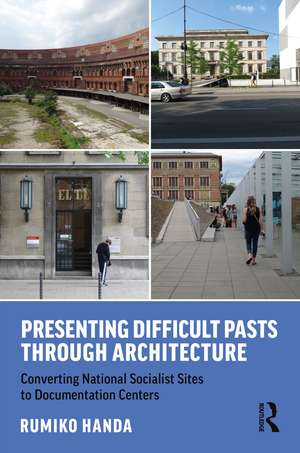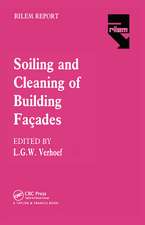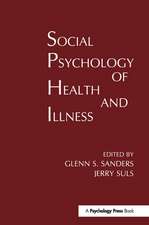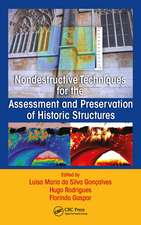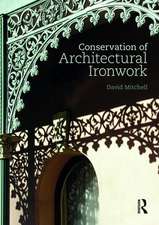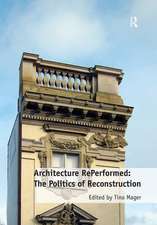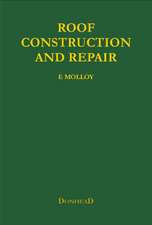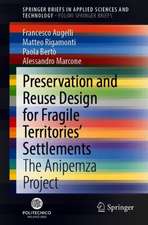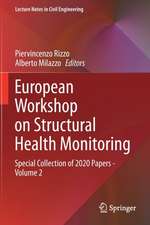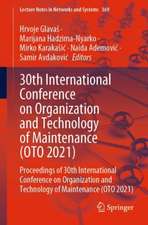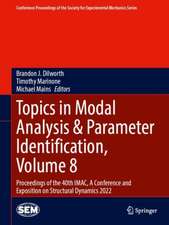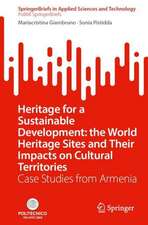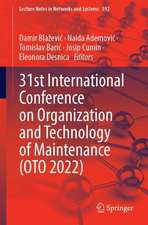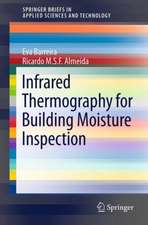Presenting Difficult Pasts Through Architecture: Converting National Socialist Sites to Documentation Centers
Autor Rumiko Handaen Limba Engleză Paperback – 25 mar 2021
Presenting Difficult Pasts Through Architecture analyzes four centers – Cologne, Nuremberg, Berlin, and Munich – from the point of view of their shared intent to make the past present at National Socialists' perpetrator sites. Applying original frameworks, Handa considers what more architectural design could do toward meaningful representations and interpretations of difficult pasts.
This book is a must-read for students, practitioners, and academics interested in how architectural design can participate in presenting the difficult pasts of historical places in meaningful ways.
| Toate formatele și edițiile | Preț | Express |
|---|---|---|
| Paperback (1) | 240.48 lei 6-8 săpt. | |
| Taylor & Francis – 25 mar 2021 | 240.48 lei 6-8 săpt. | |
| Hardback (1) | 766.12 lei 6-8 săpt. | |
| Taylor & Francis – 25 mar 2021 | 766.12 lei 6-8 săpt. |
Preț: 240.48 lei
Preț vechi: 288.52 lei
-17% Nou
Puncte Express: 361
Preț estimativ în valută:
46.02€ • 48.17$ • 38.30£
46.02€ • 48.17$ • 38.30£
Carte tipărită la comandă
Livrare economică 31 martie-14 aprilie
Preluare comenzi: 021 569.72.76
Specificații
ISBN-13: 9780367217624
ISBN-10: 0367217627
Pagini: 222
Ilustrații: 86 Halftones, black and white; 86 Illustrations, black and white
Dimensiuni: 156 x 234 x 19 mm
Greutate: 0.42 kg
Ediția:1
Editura: Taylor & Francis
Colecția Routledge
Locul publicării:Oxford, United Kingdom
ISBN-10: 0367217627
Pagini: 222
Ilustrații: 86 Halftones, black and white; 86 Illustrations, black and white
Dimensiuni: 156 x 234 x 19 mm
Greutate: 0.42 kg
Ediția:1
Editura: Taylor & Francis
Colecția Routledge
Locul publicării:Oxford, United Kingdom
Cuprins
Introduction; 1. Postwar Rebuilding and Coping with the Past; 2. Four Documentation Centers – Histories; 3. In the Shadow of Propaganda Architecture; 4. Presenting Pasts through Architecture – Intellectual Framework; 5. Formal Characteristics; 6. Physical Traces; 7. Designation; 8. Memento; Conclusion
Notă biografică
Rumiko Handa is Professor of Architecture at the University of Nebraska-Lincoln, USA. She holds a PhD in architectural theory from the University of Pennsylvania and a BArch from the University of Tokyo, Japan. Her writings have appeared in: Montreal Architecture Review; Interiors: Design, Architecture, Culture; The Journal of the Society of Architectural Historians; Preservation Education & Research; Design Studies; and so on. She co-edited Conjuring the Real: The Role of Architecture in Eighteenth- and Nineteenth-Century Fiction. She is also the author of Allure of the Incomplete, Imperfect, and Impermanent.
Recenzii
‘This book provides an intelligibly conceptualized, clearly organized and well-illustrated architectural guide to the Munich, Nuremberg, Berlin, and also Cologne documentation centers that should be of interest to both architects, curators of historical museums—especially institutions devoted to the presentation of a difficult and/or contested past—and public historians who are interested in the ability of architects to contribute to an understanding of the past and an engagement with it in the public sphere. I have often thought that these buildings deserved a monograph, and to my delight, the complexity of their architectural rhetoric has found a match in the architectural criticism, sense of scholarly perseverance, and openness to the at times ironic dimensions of museums of perpetrator history brought to the subject by Rumiko Handa.’
Pelt, Van, and Robert Jan. "Review: Presenting Difficult Pasts Through Architecture: Converting National Socialist Sites to Documentation Centers, by Rumiko Handa." The Public Historian 43, no. 4 (November 1, 2021): 153–55. https://doi.org/10.1525/tph.2021.43.4.153.
Pelt, Van, and Robert Jan. "Review: Presenting Difficult Pasts Through Architecture: Converting National Socialist Sites to Documentation Centers, by Rumiko Handa." The Public Historian 43, no. 4 (November 1, 2021): 153–55. https://doi.org/10.1525/tph.2021.43.4.153.
Descriere
Presenting Difficult Pasts through Architecture analyses four centers—Cologne, Nuremberg, Berlin, and Munich—and their shared intent to make material evidence of National Socialism involvement in authentic perpetrator sites which were part of both peaceful prior histories and now part of current everyday life.
